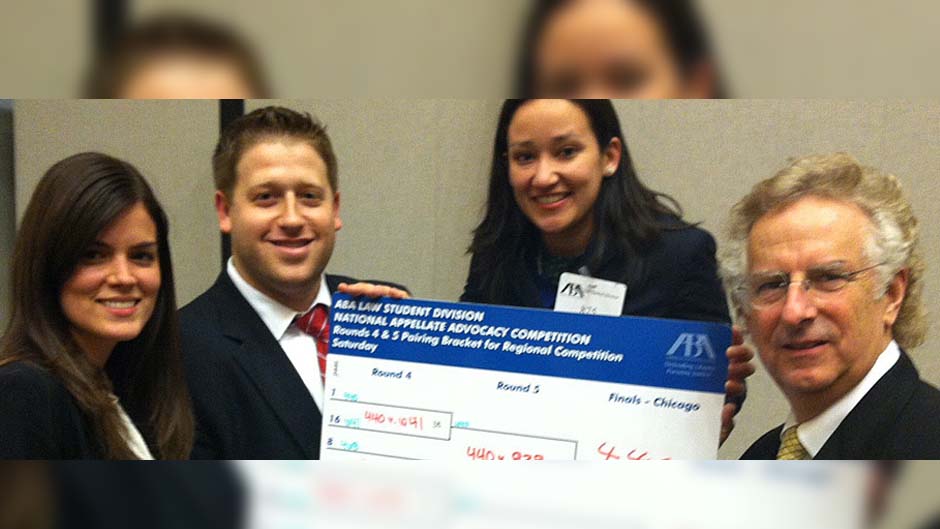In five rounds, the Miami Law students beat teams from the University of South Dakota School of Law, Brigham Young University Law School, the University of Detroit Mercy School of Law, St. Mary’s University School of Law, and Indiana University School of Law.
In addition to the team's win, Redavid was named the second Best Oralist, a mere .38 points from first place, according to the team's coach, Harvey Sepler, J.D. '84. Sepler, an Assistant Public Defender in the 11th Judicial Circuit, said the wins were eked out "after three days of being cooped up in a courthouse."
"All of us who have the good fortune to work with the school's advocacy programs know how much work goes into a team's performance, how challenging these competitions are, and how great the reward is for the competitors and the school," Sepler said. "I've been fortunate to work with the moot court program for more than 15 years and I never stop being amazed at what our students can achieve."
The ABA organizes a National Appellate Advocacy Competition every year and divides it regionally into six locations, with more than 70 teams competing in each. A team consists of two or three J.D. candidates who attend the same ABA-approved law school. Competitors participate in a hypothetical appeal to the United States Supreme Court. The competition involves writing a brief as either respondent or petitioner and then arguing the case in front of the mock court.
The regional competition consists of three qualifying rounds, with each team arguing at least once on behalf of the respondent and once on behalf of the petitioner. Teams are "power-matched" for the first two rounds according to their brief scores. After the qualifying rounds, the top 16 teams advance to the semifinal round, with the winners advancing to the final round. The winning four teams from each regional competition advance to the National Finals in Chicago in April.
"The American Bar Association deserves all the credit for putting together such a complex and fascinating problem this year," Redavid said. "From my first read-through of the record, one thing became clear: To advance in this competition it will take 100 percent of our team's efforts and concentration. Our particular draw in the Las Vegas Regional was very tough. Every school we faced was a formidable opponent. In hindsight, our very strong counterparts from other institutions made each round that much more special. It was an honor to compete across counsel table from excellent future litigators, let alone be scored higher as a team. Perhaps the most interesting aspect of this competition was the great variety in judges. From private practitioners to sitting judges, they were prepared, focused, and very active. It was an honor to represent our law school in this competition and I look forward to doing my part to continue advancing in the National Finals."
This year, the case at issue consisted of alleged violations of a person's Fourth Amendment protections against unlawful arrest and malicious prosecution. The problem was divided into two criminal law issues: whether a police officer is entitled to qualified immunity for his actions and whether a grand jury indictment breaks the causal connection between the police officer's actions and the person's arrest.
"The Las Vegas regional was very diverse," Redavid said. "We faced teams from law schools in all corners of the country, and each team proved to be a formidable opponent. The last two rounds of the competition were sudden-death rounds, with only the winning team advancing. Our hard work paid off when we heard that we defeated both teams and were awarded a spot at the finals."
Redavid said that he "striving to become the best oral advocate" he can be. "After countless hours of preparation and dozens of practice rounds, it's really nice to see the payoff," he went on. "I only hope that our law school's Moot Court Board will get the true recognition for helping me prepare."
The National Appellate Advocacy Competition emphasizes the development of oral-advocacy skills through a realistic appellate advocacy experience.
"Representing UM in such a challenging regional competition was a great learning experience, but winning it and securing a spot in nationals is surreal," Marroquin said.
"The best part of this experience was working with my fellow University of Miami School of Law teammates, our coach Professor Sepler, and our support team back in Miami," said Solano. "This truly was a team effort."
- Accessibility Options:
- Skip to Content
- Skip to Search
- Skip to footer
- Office of Disability Services
- Request Assistance
- 305-284-2374
- Display:
- Default
- High Contrast
- Accessibility Options:
- Skip to Content
- Skip to Search
- Skip to footer
- Office of Disability Services
- Request Assistance
- 305-284-2374
- Display:
- Default
- High Contrast
- Apply
- About UM
- Give to UM
-
Schools
- School of Architecture
- College of Arts and Sciences
- Miami Herbert Business School
- School of Communication
- School of Education and Human Development
- College of Engineering
- School of Law
- Rosenstiel School of Marine, Atmospheric, and Earth Science
- Miller School of Medicine
- Frost School of Music
- School of Nursing and Health Studies
- The Graduate School
- Division of Continuing and International Education
- Alumni
Miami Law Team Wins Regional ABA National Appellate Advocacy Competition

By UM News
University of Miami School of Law
-
1311 Miller Drive
Coral Gables, FL 33146 - lawcommunications@law.miami.edu
Resources
Quick Links
Communications
Legal
Copyright: 2026 University of Miami. All Rights Reserved.
Emergency Information
Privacy Statement & Legal Notices
Title IX & Gender Equity
Website Feedback
Individuals with disabilities who experience any technology-based barriers accessing University websites can submit details to our online form.
